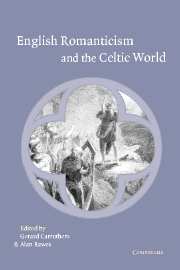Book contents
- Frontmatter
- Contents
- List of contributors
- Acknowledgements
- 1 Introduction: romancing the Celt
- 2 Sir William Jones, the Celtic Revival and the Oriental Renaissance
- 3 The critical response to Ossian's Romantic bequest
- 4 Blake and Gwendolen: territory, periphery and the proper name
- 5 The Welsh American dream: Iolo Morganwg, Robert Southey and the Madoc legend
- 6 Wordsworth, North Wales and the Celtic landscape
- 7 The force of ‘Celtic memories’ in Byron's thought
- 8 Shelley, Ireland and Romantic Orientalism
- 9 Byron and the ‘Ariosto of the North’
- 10 Scott and the British tourist
- 11 Felicia Hemans, Byronic cosmopolitanism and the ancient Welsh bards
- 12 Luttrell of Arran and the Romantic invention of Ireland
- 13 Contemporary Northern Irish poets and Romantic poetry
- Notes
- Bibliography
- Index
9 - Byron and the ‘Ariosto of the North’
Published online by Cambridge University Press: 22 September 2009
- Frontmatter
- Contents
- List of contributors
- Acknowledgements
- 1 Introduction: romancing the Celt
- 2 Sir William Jones, the Celtic Revival and the Oriental Renaissance
- 3 The critical response to Ossian's Romantic bequest
- 4 Blake and Gwendolen: territory, periphery and the proper name
- 5 The Welsh American dream: Iolo Morganwg, Robert Southey and the Madoc legend
- 6 Wordsworth, North Wales and the Celtic landscape
- 7 The force of ‘Celtic memories’ in Byron's thought
- 8 Shelley, Ireland and Romantic Orientalism
- 9 Byron and the ‘Ariosto of the North’
- 10 Scott and the British tourist
- 11 Felicia Hemans, Byronic cosmopolitanism and the ancient Welsh bards
- 12 Luttrell of Arran and the Romantic invention of Ireland
- 13 Contemporary Northern Irish poets and Romantic poetry
- Notes
- Bibliography
- Index
Summary
With regard to the ‘Ariosto of the North’ surely their themes Chivalry — war — & love were as like as can be — and as to the compliment — if you knew what the Italians think of Ariosto — you would not hesitate about that. — But as to their ‘measures,’ you forget that Ariosto's is an octave stanza — and Scott's anything but a Stanza. — If you think Scot[t] will dislike it — say so — & I expunge. — I do not call him the ‘Scotch Ariosto’ which would be sad provincial eulogy — but the ‘Ariosto of the North’ — meaning of all countries that are not the South.
(Byron to Murray, 17 September 1817)In the Romantic period the two writers who stood above the others in popular estimate were not Southey and Wordsworth or Coleridge, or Moore and Rogers or Campbell or Crabbe, but Scott and Byron. This was recognised by themselves, their critics, publishers and readers. As early as Childe Harold I and II (1812), it was customary for critics to class Byron and Scott together. Throughout their writing lives Byron and Scott were engaged in an unspoken dialogue which cannot be regarded simply as rivalry. True, Scott himself seems to invite such a reading to account for his having relinquished poetry for the novel, especially in the introductions to the 1830 edition of his poetical works and from a number of comments, such as those to Ballantyne in 1813 — ‘James, Byron hits the mark where I don't even pretend to fledge my arrow.
- Type
- Chapter
- Information
- English Romanticism and the Celtic World , pp. 130 - 150Publisher: Cambridge University PressPrint publication year: 2003
- 1
- Cited by



